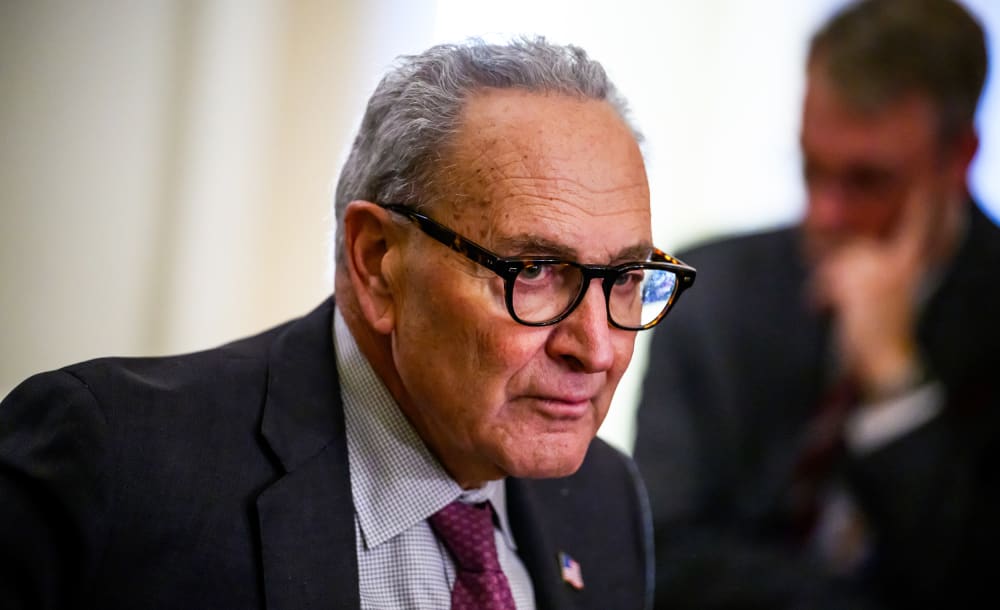For the second time this year, Senate Minority Leader Chuck Schumer is facing calls to step aside after Democrats voted with Republicans to fund the government. And this time, Schumer wasn’t even one of those Democrats.
Just hours after eight Senate Democrats brokered a deal with Republicans to end the record-breaking shutdown, many Democrats — inside and outside Congress — were directing their anger at Schumer.
Rep. Seth Moulton, D-Mass., who recently announced a bid for the Senate, posted on X Sunday that if Schumer were an effective leader, “he would have united his caucus to vote ‘No’ tonight and hold the line on healthcare.”
Rep. Ro Khanna, D-Calif., called for Schumer’s ouster as Senate Democratic leader, saying, “If you can’t lead the fight to stop healthcare premiums from skyrocketing for Americans, what will you fight for?” And Rep. Mike Levin, D-Calif., a moderate, concurred: “Chuck Schumer has not met this moment and Senate Democrats would be wise to move on from his leadership.”
Rep. Ro Khanna, D-Calif., posted, “Senator Schumer is no longer effective and should be replaced. If you can’t lead the fight to stop healthcare premiums from skyrocketing for Americans, what will you fight for?”
And moderate Rep. Mike Levin, D-Calif., posted his own dig: “Chuck Schumer has not met this moment and Senate Democrats would be wise to move on from his leadership.”
Notably, however, no Democratic senator has directly called for Schumer’s removal, though some have conspicuously been dodging questions about the minority leader’s future.
When MSNBC asked Sen. Chris Murphy, D-Conn., if he was dissatisfied with Schumer, Murphy said Schumer has “a very hard job.” But he cautioned that if Senate Democrats continue to break with the party to work with Republicans, “that would be a problem for anyone who’s in that position.”
Pressed Monday by MSNBC’s Chris Jansing about Schumer’s future, Sen. Mark Kelly, D-Ariz., initially demurred and turned the focus on the White House, saying Democrats are “dealing with an irrational president.” But when Jansing asked Kelly if he unequivocally supported Schumer as the party’s Senate leader, Kelly said, “Chuck Schumer and the leadership of the Senate are dealing with an incredibly complex situation, where it’s hard to find a way out.”
Sen. Bernie Sanders, I-Vt., told MSNBC’s Rachel Maddow that he could “make the case that Chuck Schumer has done a lot of bad things — but I think getting rid of him, who is going to replace him?” Sanders is an ally of Rep. Alexandria Ocasio-Cortez, D-N.Y., who has been floated as a potential primary challenger to Schumer, who is up for reelection in 2028.
Others more firmly stood by the 74-year-old New Yorker, who has served as the Democratic leader in the Senate since 2017, when he replaced former Nevada Sen. Harry Reid.
Sen. Richard Blumenthal, D-Conn., who argued that Republicans had forced Democrats to make an “impossible false choice” in exiting the shutdown, said Schumer “led us through some very hard times, and the Democratic caucus is still behind him.”
Sen. Tim Kaine, D-Va., who voted to advance the bipartisan deal, said “yes” when asked if he’s happy with Schumer’s leadership.
Others suggested a debate over Schumer’s future is not productive at this time.

“All of us who are really appalled by what’s going on and the loss of health care, we have to stay focused on the main prize, and that is winning the next election, so we have the capacity to push back and protect America,” Sen. Peter Welch, D-Vt., said.
While multiple sources tell MSNBC Schumer was aware of the contours of the negotiations between rank-and-file Democrats and Republicans, they say he did not give the deal his blessing.
“I’ve been in many of those rooms, and he fought like hell against that,” Sen. Brian Schatz, D-Hawaii, told reporters.
However, when asked by reporters on Monday if Schumer tried to dissuade her from the talks, Sen. Jeanne Shaheen, D-N.H., one of the key negotiators, answered simply: “No.”
Schumer, for his part, has publicly railed against the plan for not addressing Affordable Care Act subsidies. “This health care crisis is so severe, so urgent, so devastating for families back home that I cannot in good faith support this CR that fails to address the health care crisis,” he said Monday on the Senate floor, referring to the continuing resolution to fund the government.











